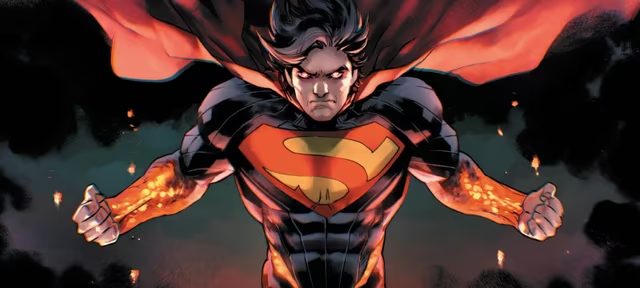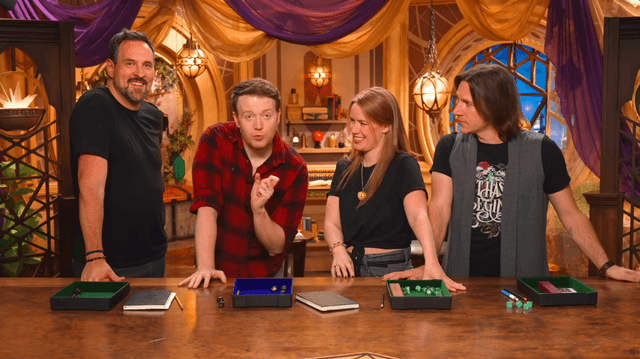If you click on a link and make a purchase we may receive a small commission. Read our editorial policy.
How Andor introduced a new kind of Star Wars hero
What Star Wars: Andor teaches us about everyday rebellion.

Popverse's top stories
- Matthew Lillard got his Daredevil: Born Again role because he's DM to the showrunner
- DC is developing a new Batman comic with Cliff Chiang & Brian Azzarello, reuniting the 'New 52' Wonder Woman duo
- Livestream Critical Role, The Boys, and more panels from Seattle's ECCC 2026 free thanks to Signet Collectibles!
In a franchise obsessed with 'Chosen One' narratives and mystical lineages, Star Wars' Andor stands out by focusing on the rebellion’s unsung heroes, exploring how people with seemingly little power can change the galaxy. This theme defines the personal journey of Cassian Andor toward his role in Rogue One: A Star Wars Story, but it’s even more apparent among the show’s supporting cast, who emerge from a grimly plausible depiction of life under a fascist regime.
The original Star Wars trilogy didn’t offer a particularly sophisticated overview of the Rebel Alliance and its supporters, which is fair enough. At heart, those movies tell a kid-friendly fantasy story, and by necessity, their political elements are pretty straightforward, casting the rebels as scrappy underdogs led by larger-than-life heroes.
The rebels of Andor are scrappy underdogs as well, but in their world, the oppressive power of the Empire feels much more urgent. Taking place during one of the darkest periods of Emperor Palpatine’s reign, this show introduces us to a diverse array of 'little guy' characters who find their own ways to fight back - often because they’re pushed to breaking point, which is pretty much how revolutions function in real life.
It’s deceptively easy to forget that the inciting incident of Luke Skywalker’s origin story has nothing to do with the Force. It’s actually the death of his adoptive parents, a life-changing moment that propels him to join the Rebellion rather than chase his childhood dream of becoming an Imperial fighter pilot. For obvious reasons, A New Hope doesn’t linger on his grief, but in a gritty, adult-rated spinoff, there’s more room to explore a kind of traumatic motivation, whether it’s the tragedy of Cassian’s childhood or how the tightening grip of the Empire gradually radicalizes the citizens of Ferrix. A lot of the most impactful characters in Andor have no connection to the 'official' rebellion and no real sense of political allegiance. They’re just doing their best under difficult circumstances, discovering that they have more leverage than they previously believed.
To many viewers catching up with Andor in 2025, these stories will likely take on a new level of real-life resonance, echoing public conversations about how people can work collectively to resist fascism. Here, we decided to look back over some of Andor’s most insightful side-characters, exploring how they embody different facets of the rebellion.
Star Wars: Andor's Brasso, played by Joplin Sibtain

Cassian’s friend Brasso is one of the first characters we meet on Ferrix, a dockworker who covers for Cassian when he’s being hunted by a squad of Preox-Morlana corporate police. Like most Ferrixians, Brasso has little affection for the Empire, and when the cops raid his hometown in search of Cassian, Brasso helps out by sabotaging their transport ship.
Like many of the show’s rebels, Brasso has no specific political affiliation and no ambitious goals to change the galaxy. Instead, he’s motivated by his sense of injustice and his deep loyalty to his community, including his longtime friendship with Cassian. His life is rooted in Ferrix’s identity as an industrial planet, establishing the idea of a close-knit working-class culture.
As Andor season 1 draws to a close and Cassian returns to Ferrix, he arrives to find his friends and neighbors at a political turning point. After years of Imperial occupation, the increasing levels of brutality have sparked a newfound desire to fight back, ultimately provoking a riot where Brasso plays a prominent role. It’s a reminder that by telling this kind of story within a sci-fi/fantasy setting, Andor can cover topics that aren’t really permitted in mainstream TV dramas set in the real world.
Elsewhere in American pop culture, you’re far more likely to see the police portrayed as the heroes. Riots are rarely (if ever) portrayed in a positive light, unless they take place in a historical drama about a political movement whose goals are no longer considered controversial. Here, we get a surprisingly clear-eyed view of the reasons why regular people might end up fighting in the streets of their hometown, charted through the experiences and moral decisions of characters like Brasso - a person who the Imperial forces and Preox-Morlana cops would never consider to be important.
Star Wars: Andor's Karis Nemik, played by Alex Lawther

During Andor’s second chunk of episodes, we meet our first 'real' rebels. Plotting to attack an Imperial outpost on the planet Aldhani, this team undoubtedly qualifies as a terrorist cell. As a group, they’re pragmatic and unglamorous, each with their own reasons for abandoning their civilian lives to join the rebellion.
Among them is Karis Nemik, an intellectual who is already thinking forward to how the galaxy might function after they defeat the Empire. He’s a big-picture thinker, penning a manifesto covering topics that Cassian himself has clearly never considered in any depth.
In many ways, Karis comes across as the polar opposite of the rebel heroes we meet in the Original Trilogy, introduced as a sensitive young man who keeps falling asleep on the job. He isn’t a natural warrior, but he’s willing to die for the cause. And after their mission on Aldhani, he does. His team is an obvious precursor to the doomed heroes of Rogue One, toiling on the sidelines without the kind of recognition awarded to more palatable figures like Luke Skywalker.
After his death, Karis Nemik’s manifesto is passed on to Cassian, who is only halfway through his journey to becoming a die-hard rebel agent. In later episodes, that manifesto defines many of the show’s greatest acts of revolution:
"Freedom is a pure idea. It occurs spontaneously and without instruction. Random acts of insurrection are occurring constantly throughout the galaxy. There are whole armies, battalions that have no idea that they've already enlisted in the cause."
Star Wars: Andor's Kino Loy, played by Andy Serkis

Kino Loy participates in one such act of insurrection, although you wouldn’t predict it from his first appearances in the show. Introduced during a storyline where Cassian is incarcerated in an Imperial prison, Kino is a prisoner who thrives within the system. Acting as a kind of middle-manager between the guards and inmates, he oversees the prison’s factory floor, where Cassian and hundreds of other men are forced to build machinery for the Empire.
At first, Kino is an antagonistic figure, willingly enforcing the Empire’s laws and acting as a roadblock for Cassian’s attempts to escape. He’s working under the assumption that his sentence will soon be over, but when he learns that the Empire has no intention of releasing any of the prison’s inmates (who are, after all, an easily controlled workforce of slave labor), Kino realizes that the only way out is to escape.
Motivated by righteous fury, Kino uses his limited authority to help Cassian lead a prison revolt, overpowering the guards and freeing the prisoners. His actions allow Cassian to survive and play a crucial role in the Rebellion, along with saving the lives of countless others. Although for Kino Loy himself, it’s not a happy ending. The only way out of the prison is across the ocean, and he can’t swim, concluding his arc on an act of unknowing self-sacrifice.
Star Wars: Andor's Maarva Andor, played by Fiona Shaw

In the final episodes of Andor’s first season, Cassian’s adoptive mother Maarva embodies the community spirit of Ferrix, inspiring her neighbors to riot against the city’s occupying forces. Before that, however, she spends years living in fear.
Maarva has more reasons than most to hate the Empire. Not only did they invade her home planet, but they executed her husband, leaving her as a single mother. For understandable reasons, she’s afraid of losing Cassian to a similar act of state-sanctioned violence, and for much of her screentim,e we see her as a vulnerable old woman, cared for by her friends and neighbors after Cassian is forced to flee. But after her death, when Cassian returns to Ferrix for her funeral, we begin to understand the real extent of her influence.
As a member of the social club Daughters of Ferrix, Maarva has deep ties within the city’s community, clearly inspiring a lot of love and respect. Her neighbors also presumably remember how she lost her husband, so when she dies during a particularly tough period of Imperial occupation, her funeral becomes a rallying cry.
Speaking from beyond the grave, Maarva presides over her own funeral procession in hologram form, delivering a pre-recorded speech about the necessity of rebellion.
“We’ve been sleeping,” she says. “There is a darkness reaching like rust into everything around us. We let it grow, and now it’s here.”
Soon, the citizens are fighting back against the stormtroopers lining the streets of the procession route, with Brasso - in an act of very obvious symbolism - using Maarva’s funerary stone as a weapon. It’s Andor’s most explicit example of rebellion occurring “spontaneously and without instruction,” wrapping up season 1 with a clear message about the power of a civilian uprising.
Get to know, understand, and love the Star Wars franchise more with our Star Wars watch order, guide to all the upcoming Star Wars movies & TV shows, and all the Star Wars movies and Star Wars TV shows ranked.
Follow Popverse for upcoming event coverage and news
Find out how we conduct our review by reading our review policy
Let Popverse be your tour guide through the wilderness of pop culture
Sign in and let us help you find your new favorite thing.
















Comments
Want to join the discussion? Please activate your account first.
Visit Reedpop ID if you need to resend the confirmation email.